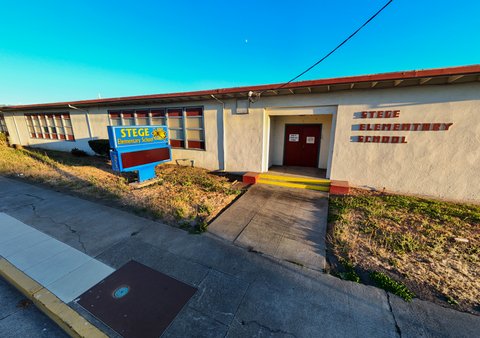
17 Nov County Reports Low Response to Community Impact Fund Survey, Still Seeking Public Input

(Image courtesy of Contra Costa County via Bay City News)
By Arianna Caramagno
Less than 1% of Contra Costa County residents responded to a survey aimed at helping the officials decide how to spend a one-time Community Impact Fund. Nevertheless, two supervisors say they have a handle on each of their district’s priorities. And residents will get another opportunity to have a say in the process at Tuesday’s Board of Supervisors meeting.
Contra Costa County is home to more than 1.1 million residents across five supervisorial districts. Overall, 2,758 people answered the survey. Residents of District 1 in West County had the fewest responses to the survey with only 414. Residents from District 5 in East County were responsible for the majority of the responses with 768.
District 1 Supervisor John Gioia and District 5 Supervisor Shanelle Scales-Preston both told the Pulse that while the results from the survey are important, the numerous town hall meetings they held both in person and over Zoom yielded feedback that they say was representative of their respective districts.
“We [District 1] held more town hall meetings than any other district,” said Gioia. “What is just as important is the town hall meetings that we held in person and hybrid. We had 275 people participate.”
Sixty of those people attended a youth-only town hall. According to a report on District 1’s town halls, attendees’ priorities at the youth meeting were, in order: education/career pathways; housing and environment, which tied; health; transportation; and immigration.
Gioia also said the low turnout was to be expected.
“It is not uncommon to get two to three thousand people responding to a countywide survey,” said Gioia. “Unless you put something on the ballot, you’re generally not going to get a greater response than that.”
According to survey data, the biggest challenge facing households in Contra Costa County is high housing costs. For the entire county, the top three most important community outcomes for respondents and their households were safe neighborhoods, followed by quality schools and education, and lastly, a clean environment.
Each district received $1 million from the Community Impact Fund. The board will review the survey results and discuss how some of the money should be spent and what happens next at its meeting Tuesday. Along with the ongoing town hall meetings, the survey was intended to help guide the usage of those dollars.
“Just looking at the survey on Nov. 18, when we have an opportunity to go through this, is figuring out what type of things that we can be doing to help support [the] community in terms of funding with the remaining FEMA ARPA dollars we have,” said Scales-Preston, referring to American Rescue Plan Act funding, which is the source of the Community Impact Funds.
Gioia said District 1 will specifically aim to allocate the money toward closing housing and economic disparities and achieving greater equity. Both issues were part of the initial purpose of the federal American Rescue Plan Act.
According to Gioia, the priorities from highest to lowest in the District 1 town halls were mental health and wellness, education and career pathways, housing and housing supports, environmental issues, legal services, transportation, and arts. Like other district supervisors, Gioia plans to put together a grant application for local community-based organizations to propose ways to combat the economic and health disparities.
“We don’t always have opportunities to be able to provide organizations and nonprofits with funds,” said Scales-Preston. “Being able to put these dollars to where certain needs need to be met I think is a huge deal.”
Both Gioia and Scales-Preston said the $1 million given to each district can only go so far. Scales-Preston said the 225 requests for grants from organizations in District 5 has far exceeded the allocated funds.
“The total number of requests that I had received so far totaled to [over] $14 million,” she said.
While Gioia shared similar sentiments about the amount of Community Impact Funds, he also noted that the fund is supplemental to the total budget of the county.
“A million dollars is a drop in the bucket,” said Gioia. “I think it’s important to note this is not the only source of funds to do work. The county’s budget is $7 billion.”
Public safety, affordable housing, infrastructure, and education are all areas that the survey indicated residents would prioritize if funding was available in their communities. Many residents of District 1 specifically noted Richmond as a city that needs additional support. Gioia said the Community Impact Fund will indeed partly be used to invest in programs within Richmond as well as other cities in the district.
“I think what we’re going to do is solicit applications from community-based organizations who are doing good work today in West County and Richmond,” said Gioia. “Our plan is to provide funding for programs that are improving opportunities for youth and improving healthcare.”
Safe neighborhoods, education, youth programs, and affordable housing were key issues highlighted by residents of District 5. To address them, Scales-Preston said she is focusing on specific feedback to better approach the unique issues of each community.
“In each of my areas, I’ve been trying to listen to what the community wants,” said Scales-Preston. “Issues going on in Rodeo are so different from issues that might be going on in Pittsburg, Antioch and Bay Point.”
According to Scales-Preston, she held eight community meetings between September and October in addition to meeting with the community five other times earlier this year. Many of the issues that came up the most in the survey have been continually brought up by residents.
“These are things that I have been hearing just because I was already on the ground in the community,” said Scales-Preston.
Although each district’s responses were focused on different issues, across the county, 45% of survey takers said that investing extra resources into communities that have faced long-term disinvestment disparities was extremely important.
The Community Impact Fund and survey will be discussed at the Board of Supervisors meeting, which starts at 9 a.m. Tuesday. People may attend in person in the Board of Supervisors Chambers at 1025 Escobar St. in Martinez or on Zoom by visiting https://cccounty-us.zoom.us/j/89586041575. The meeting’s agenda contains links to review the reports and recommendations associated with the fund and information on how to participate in the public comment period.





No Comments